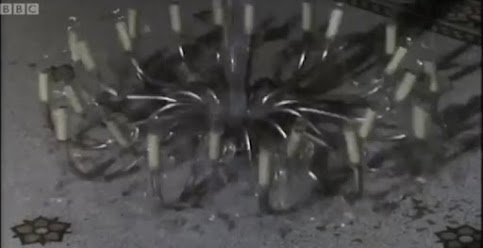Del boy, Rodney and Grandad, from the comedy series Only
Fools & Horses, are normally associated with Peckham, South London. Yet one
of their most memorable scenes was filmed at Iwerne Minster in North Dorset.
The December 1982 programme ‘A Touch of
Glass’ attracted over 10 million television viewers. It is frequently
regarded as Only Fools & Horses’ fans favourite scene of the show.
Derek Trotter had been given the job of cleaning a valuable
glass chandelier at country mansion, Ridgemore Hall. With Del and Rodney up
ladders, and only an old sheet between the priceless chandelier and the floor, it
was inevitable something would go wrong. Grandad detached the wrong chandelier
and it smashed on the floor. As Grandad queried, ‘Is it very valuable?’ To which Del retorted, ‘Not really. It was bleeding priceless when it was hanging up there,
though!’
Ridgemore Hall was in fact Clayesmore School at Iwerne
Minster. However, as the school would not allow the floorboards to be pulled up,
the scene of granddad unfastening the nut was filmed elsewhere. The smashed
chandelier was a prop but it still cost around £6,000 to make. Only one was
made, so the scene could be filmed just once. Struggling to suppress their
laughter, the cast and crew just managed not to spoil the shot.
Such did Del boy, Rodney and Grandad experience a smashing
time in deepest Dorset.
(Illustrations: credit BBC Television.)




Del Boy, a character from the British sitcom "Only Fools and Horses," found himself in Dorset, where he stumbled upon a magnificent chandelier while shopping for sleeping quilts.
ReplyDelete